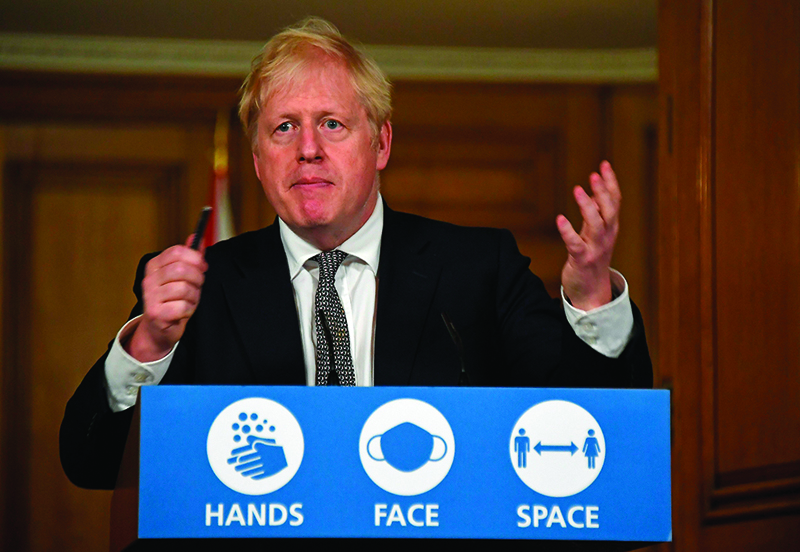
LONDON: Britain's Prime Minister Boris Johnson has announced a new four-week coronavirus lockdown in England, which will join several European countries in imposing the measure for a second time, as Slovakia took a different tack and began testing its entire population. Global infections are fast approaching 46 million, with close to 1.2 million deaths, and Europe is experiencing a dizzying spike in COVID-19 cases.
Under-pressure governments on the continent are scrambling to contain the outbreaks, with the re-imposition of restrictions sparking widespread exasperation and sometimes violent protests. "Now is the time to take action because there's no alternative," Johnson said. "We have got to be humble in the face of nature. In this country, alas, as in much of Europe, the virus is spreading even faster than the reasonable worst-case scenario of our scientific advisers."
Under the new lockdown, planned to start on Thursday and end on Dec 2, England's population must stay at home except when exemptions apply, such as for work, education or exercise, while all but essential shops will close. The devolved governments of Scotland, Wales and Northern Ireland have already imposed partial lockdowns. Britain's infections surged past one million on Saturday.
The four-week coronavirus lockdown in England will be extended if it fails to reduce infection rates, the government said yesterday, as it faced criticism over the abrupt decision to shut down again. Senior minister Michael Gove said the government would maintain the stringent measures if the R rate - the number of people one person with the virus is likely to infect - remained above one.
"With a virus this malignant, and with its capacity to move so quickly, it would be foolish to predict with absolute certainty what will happen in four weeks' time," he told Sky News. "And so therefore of course we will review what requires to be done but we have a clear plan over the next four-week (period)," he added.
Under the new rules, people must stay at home except in cases where exemptions apply, such as for work, education or exercise. In contrast to the months-long UK-wide lockdown earlier this year, schools, colleges and universities will remain open. But pubs and restaurants will shut unless serving takeaway food, while all leisure and entertainment venues and non-essential shops will close.
Just minutes after Johnson, Portugal's Prime Minister Antonio Costa announced a partial lockdown with 70 percent of the population going back under restrictions. Also on Saturday, Austria brought in a second lockdown of its own, while Greece declared a partial one. The new measures came just a day after France started its second lockdown and Belgium said it would tighten its measures. Italy has also already reintroduced some restrictions.
This time around in Europe, there have been sometimes-violent protests against the measures. "This city will go bust. There will be nothing left of it," Roger Stenson, a 73-year-old pensioner in Nottingham, said ahead of Britain's lockdown announcement, echoing widespread concerns about the economic impact. "You know, closed shops… There will just be nothing left of it, that's the problem."
Iran's daily tally of coronavirus deaths hit a record high of 434 yesterday, the health ministry announced, and the head of a top medical body said the actual toll was at least three times higher than the official count. The deaths, announced by health ministry spokeswoman Sima Sadat Lari on state TV, take the official toll to 35,298 in the Middle East's worst-hit country. She said the number of confirmed coronavirus cases increased by 7,719 to 620,491.
The head of Iran's Medical Council, Mohammadreza Zafarghandi, doubted the accuracy of the official toll and warned that Iran had reached a "catastrophic mortality rate", the Students News Agency ISNA reported yesterday. "The official death toll is only based on the number of registered patients," Zafarghandi told ISNA.
"Through field surveys in hospitals and cemeteries, our Council has obtained a figure at least three times higher than the official death toll." The medical council is a non-governmental organization that is responsible for licensing doctors in Iran. "Thousands of our health workers were infected with the virus and according to our statistics, 300 of them had died," Zafarghandi said.
With no vaccine yet available, governments have limited tools at their disposal to counter the spread of the virus. In Slovakia, the government has decided to take a different approach to other European countries and test its entire population of 5.4 million, with Prime Minister Igor Matovic describing the strategy as the EU nation's "road to freedom". But in the lesser privileged parts of the world with little or no infrastructure and resources, there are fewer options.
The United States remains the worst-hit country in the world, with 9.1 million infections, more than 230,000 deaths and fresh spikes in many parts of the vast nation. COVID-19 has been one of the dominant campaign issues ahead of the presidential election on Nov 3, with millions of jobs lost and Donald Trump facing intense criticism over his handling of the pandemic.
Trump himself got COVID-19, as did members of his family and staff, but he has been critical of lockdown measures over their economic impact, belittled mask-wearing by his Democratic challenger Joe Biden, and organized rallies with thousands of supporters despite warnings about the risk of transmission. The president has accused the media of overplaying the threat of the virus, but with tens of millions of Americans suffering because of the pandemic, some voters appear to be seeking an alternative.
They include Kimberly McLemore, a 56-year-old from Florida who did not see Trump taking the pandemic seriously. "In good conscience, I cannot vote for this man," the lifelong Republican told AFP, adding that both her parents, who are in their eighties, also voted for Biden - the first time they had voted for a Democrat. - Agencies









